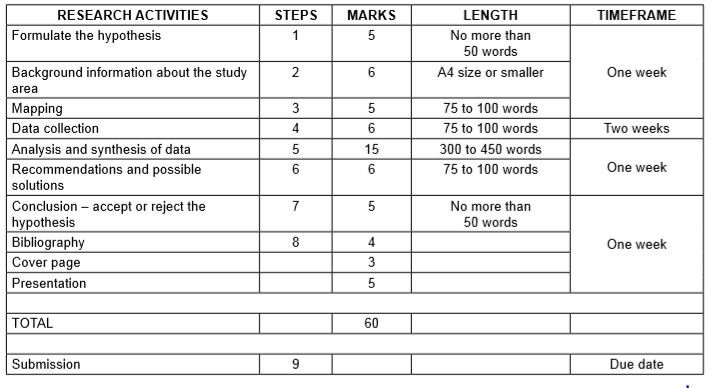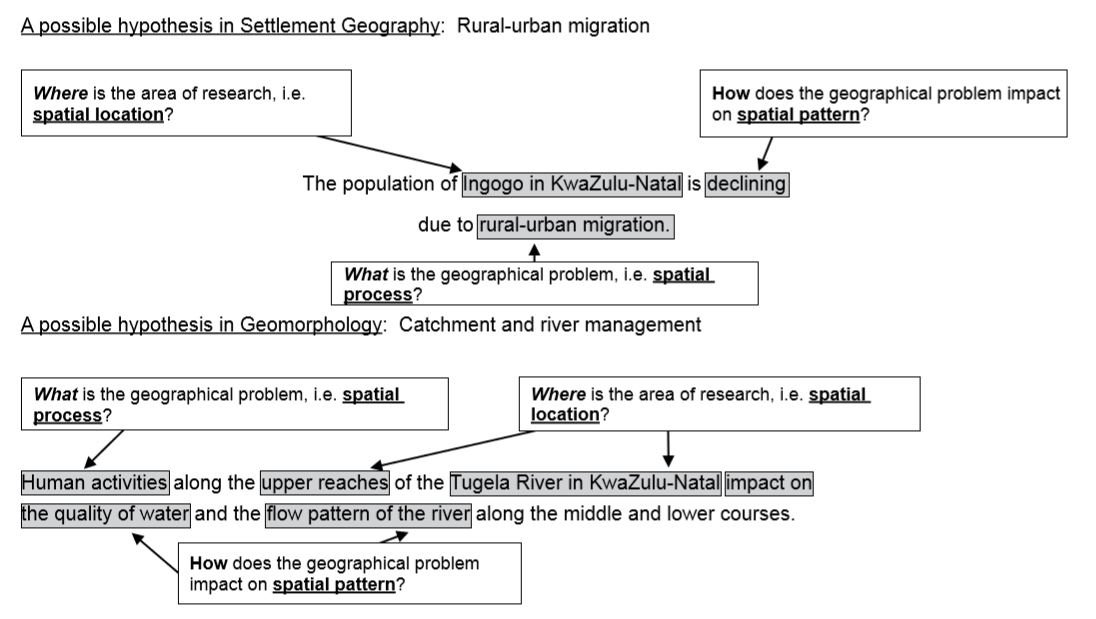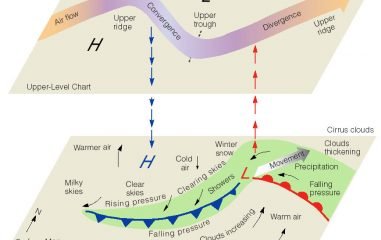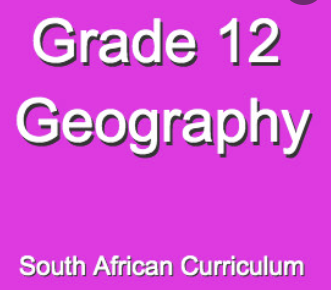
Geography Grade 12 Research Tasks (Topics) and Memos (SBA)

Geography Grade 12 Research Tasks (Topics) and Memos for: term 1, Term 2, Term 3 and Term 4
Assessment is a continuous planned process of identifying, gathering and interpreting information about the performance of learners, using various forms of assessment. It involves four steps: generating and collecting evidence of achievement; evaluating this evidence; recording the findings and using this information to understand and assist with the learners’ development to improve the process of learning and teaching. Assessment should be both informal (assessment for learning) and formal (assessment of learning). In both cases regular feedback should be provided to learners to enhance the learning experience.
School-based assessment (SBA) is a purposive collection of learners’ work that tells the story of learners’ efforts, progress or achievement in given areas. The quality of SBA tasks is integral to learners’ preparation for the final examinations.
This booklet serves as a resource of four exemplar SBA tasks to schools and subject teachers of Geography. SBA marks are formally recorded by the teacher for progression and certification purposes. The SBA component is compulsory for all learners. Learners who cannot comply with the requirements specified according to the policy may not be eligible to enter for the subject in the final examination.
The formal assessment tasks provide the teacher with a systematic way of evaluating how well learners are progressing. This publication includes tests, a project and a case study. Formal assessment tasks form part of a year-long formal programme of assessment. These tasks should not be taken lightly and learners should be encouraged to submit their best possible efforts for final assessment.
The teachers are expected to ensure that assessment tasks are relevant to and suitable for the learners being taught. Teachers should adapt the tasks to suit learners’ level of understanding and should be context-bound; however, they should also take cognisance of the requirements as set out in the Curriculum and Assessment Policy Statement (CAPS) document.
Table of Contents

Geography Grade 12 Research Tasks
Term 2 2024 research tasks.
- Geography Grade 12 Term 2 2024 Research Tasks
Term 2 2023 Research Tasks
- Geography Grade 12 Research Task Term 2 Project 2023 Answer Guide: Limpopo
Video Guide
What Skills are Assessed for Research Tasks in Grade 12
The following skills are assessed. Some/All of these skills may be tested in any external examination:
- Gathering data
- Interpreting data
- Analysing data
- Comparing different sets of data
- Representing data in written, graphic or mapped format
- Problem-solving
- Drawing conclusions
- Hypothesis statements
Research framework for assessment (Guideline on administration of research task)

Step 1: Formulating a hypothesis/problem statement.
Guideline: geography grade 12 research tasks.
Step 1: Formulating a hypothesis/problem statement. As Geographers we seek to understand and explain the interactions amongst humans, and between humans and the environment in space and time. This is achieved by asking questions or making informed geographical decisions. This entails the development of a hypothesis or a problem statement to be tested.
- You have to choose a specific area of study where a geographical problem exists.
- During this stage, a geographical question showing a problem is asked.
- Identify the problem from a local area.
- Formulate a hypothesis or a problem statement. (Hypothesis research is used to prove that certain variables are dependent on or independent of each other. Problem statement research is only to highlight that a specific problem exists in a specific community.)
- You should then follow the steps of research to ensure that the geographical question is answered.

Geography Research Project Topics for Grade 12 South Africa
- The value of property along north-facing slopes is higher than the value of property along south-facing slopes in Meyersdal, Gauteng (choose local area).
- The cause of rural-urban migration in Ndwedwe, KwaZulu-Natal (choose local area), is the lack of service delivery in the health sector.
- Climate change will impact negatively on grape farming and related industries in the Western Cape.
- The closing down of many primary schools in Lusikisiki (Eastern Cape) (choose a local area) is due to a decline of the population in the age group 7 to 15 years.
- The poor condition of roads (specify the names of the roads) leading to/in Harrismith, Free State (choose local area), is due to the lack of proper planning by the local municipality.
- The impact of building a dam along the Jukskei River in Gauteng (choose local area) upstream of Alexandra will reduce flooding and the subsequent loss of life in Alexandra.
- The e-toll system will impact negatively on the economic position of people using private transport in Gauteng.
- The e-toll system will impact positively on traffic flow to the major urban centres in Gauteng.
- Informal settlements in the Vhembe district of Limpopo have low levels of development due to the lack of provision of basic needs (choose ONE informal settlement in your local area.)
- Overcrowding of informal settlements is due to the lack of proper planning by the local government (choose local area).
Step 2: Background information about an area of study
- You must explain where in South Africa the study area is located. (This can be indicated on the map.)
- Describe the study area in terms of its exact position (degrees, minutes and seconds).
- Provide relevant information about the area, for example population of the area or climate of the area.
Step 3: Mapping
- You must provide a map of the area in question.
- During this stage you must create a buffer zone around the area where the geographical problem exists.
- The map should have a clear legend/key and must be drawn to scale. The scale must be indicated on the map.
- If the map used covers a wider area, buffer zones around the area of study should be created.
- The map used should be the most recent map of the study area
Step 4: Methods of data collection
(a) PRIMARY DATA SOURCES
- The use of questionnaires
- Observations
- Field trips
(b) SECONDARY DATA SOURCES
- Newspaper articles
- Government department statistics
Step 5: Analysis and synthesis of data
• Learners must use collected data now to formulate a discussion around the existing geographical problem. • At this stage learners should represent some of the information graphically where necessary, for example graphs and sketches. • Learners must analyse graphic information during this stage.
Step 6: Recommendations and possible solutions
• Learners should now make recommendations to solve the geographical problem in question. • Learners should present their original and realistic opinions as far as they possibly can.
Step 7: Conclusion – accept or reject the hypothesis
- Learners should now take a decision to either ACCEPT or REJECT the hypothesis.
- Learners must give reasons for either ACCEPTING or REJECTING the hypothesis
Step 8: Bibliography
- Learners must include a comprehensive bibliography.
- Learners must list websites in full.
- Learners must include annexures of questionnaires and interviews conducted
View all # Geography-Grade 12 Study Resources
We have compiled great resources for Geography Grade 12 students in one place. Find all Question Papers, Notes, Previous Tests, Annual Teaching Plans, and CAPS Documents.
More Geography Grade 12 Resources
- Why do Tropical Cyclones Develop in Late Summer?
- What is the impact of coriolis force and latent heat on the development of tropical cyclones?
- Geography 2020 Past Papers
- Geography 2019 Past Papers
Grade 12 Geography Exam Papers and Memos for 2019 September and November
- Geography Grade 12 Research Tasks (Topics) and Memos
Useful Links
- Mid Latitude Cyclones Notes Grade 12
Geography Grade 12 2019 Exam Papers and Memos
Geography Grade 12 2020 Past Papers and Memos
Geography Mind the Gap study guide: Grade 12 Download
Read All Posts

Grade 12 Geography
Geography grade 12 research tasks (topics) and memos (sba).
Geography Grade 12 Research Tasks (Topics) and Memos for: term 1, Term 2, Term 3 and Term 4
Assessment is a continuous planned process of identifying, gathering and interpreting information about the performance of learners, using various forms of assessment. It involves four steps: generating and collecting evidence of achievement; evaluating this evidence; recording the findings and using this information to understand and assist with the learners’ development to improve the process of learning and teaching. Assessment should be both informal (assessment for learning) and formal (assessment of learning). In both cases regular feedback should be provided to learners to enhance the learning experience.
School-based assessment (SBA) is a purposive collection of learners’ work that tells the story of learners’ efforts, progress or achievement in given areas. The quality of SBA tasks is integral to learners’ preparation for the final examinations.
This booklet serves as a resource of four exemplar SBA tasks to schools and subject teachers of Geography. SBA marks are formally recorded by the teacher for progression and certification purposes. The SBA component is compulsory for all learners. Learners who cannot comply with the requirements specified according to the policy may not be eligible to enter for the subject in the final examination.
The formal assessment tasks provide the teacher with a systematic way of evaluating how well learners are progressing. This publication includes tests, a project and a case study. Formal assessment tasks form part of a year-long formal programme of assessment. These tasks should not be taken lightly and learners should be encouraged to submit their best possible efforts for final assessment.
The teachers are expected to ensure that assessment tasks are relevant to and suitable for the learners being taught. Teachers should adapt the tasks to suit learners’ level of understanding and should be context-bound; however, they should also take cognisance of the requirements as set out in the Curriculum and Assessment Policy Statement (CAPS) document.
- 1 What Skills are Assessed for Research Tasks in Grade 12
- 2.0.1 Guideline: Geography Grade 12 Research Tasks
- 2.1 Geography Research Project Topics for Grade 12 South Africa
- 3 Step 2: Background information about an area of study
- 4 Step 3: Mapping
- 5 Step 4: Methods of data collection
- 6 Step 5: Analysis and synthesis of data
- 7 Step 6: Recommendations and possible solutions
- 8 Step 7: Conclusion – accept or reject the hypothesis
- 9 Step 8: Bibliography
- 10 More Geography Grade 12 Resources
- 11 Mid Latitude Cyclones Notes Grade 12
- 12 Geography Grade 12 2019 Exam Papers and Memos
- 13 Geography Grade 12 2020 Past Papers and Memos
- 14 Geography Grade 12 Research Tasks (Topics) and Memos (SBA)
- 15 Grade 12 Geography Exam Papers and Memos for 2019 September and November
- 16 Geography Mind the Gap study guide: Grade 12 Download
What Skills are Assessed for Research Tasks in Grade 12
The following skills are assessed. Some/All of these skills may be tested in any external examination:
- Gathering data
- Interpreting data
- Analysing data
- Comparing different sets of data
- Representing data in written, graphic or mapped format
- Problem-solving
- Drawing conclusions
- Hypothesis statements
Research framework for assessment (Guideline on administration of research task)

Step 1: Formulating a hypothesis/problem statement.
Guideline: geography grade 12 research tasks.
Step 1: Formulating a hypothesis/problem statement. As Geographers we seek to understand and explain the interactions amongst humans, and between humans and the environment in space and time. This is achieved by asking questions or making informed geographical decisions. This entails the development of a hypothesis or a problem statement to be tested.
- You have to choose a specific area of study where a geographical problem exists.
- During this stage, a geographical question showing a problem is asked.
- Identify the problem from a local area.
- Formulate a hypothesis or a problem statement. (Hypothesis research is used to prove that certain variables are dependent on or independent of each other. Problem statement research is only to highlight that a specific problem exists in a specific community.)
- You should then follow the steps of research to ensure that the geographical question is answered.

Geography Research Project Topics for Grade 12 South Africa
- The value of property along north-facing slopes is higher than the value of property along south-facing slopes in Meyersdal, Gauteng (choose local area).
- The cause of rural-urban migration in Ndwedwe, KwaZulu-Natal (choose local area), is the lack of service delivery in the health sector.
- Climate change will impact negatively on grape farming and related industries in the Western Cape.
- The closing down of many primary schools in Lusikisiki (Eastern Cape) (choose a local area) is due to a decline of the population in the age group 7 to 15 years.
- The poor condition of roads (specify the names of the roads) leading to/in Harrismith, Free State (choose local area), is due to the lack of proper planning by the local municipality.
- The impact of building a dam along the Jukskei River in Gauteng (choose local area) upstream of Alexandra will reduce flooding and the subsequent loss of life in Alexandra.
- The e-toll system will impact negatively on the economic position of people using private transport in Gauteng.
- The e-toll system will impact positively on traffic flow to the major urban centres in Gauteng.
- Informal settlements in the Vhembe district of Limpopo have low levels of development due to the lack of provision of basic needs (choose ONE informal settlement in your local area.)
- Overcrowding of informal settlements is due to the lack of proper planning by the local government (choose local area).
Step 2: Background information about an area of study
- You must explain where in South Africa the study area is located. (This can be indicated on the map.)
- Describe the study area in terms of its exact position (degrees, minutes and seconds).
- Provide relevant information about the area, for example population of the area or climate of the area.
Step 3: Mapping
- You must provide a map of the area in question.
- During this stage you must create a buffer zone around the area where the geographical problem exists.
- The map should have a clear legend/key and must be drawn to scale. The scale must be indicated on the map.
- If the map used covers a wider area, buffer zones around the area of study should be created.
- The map used should be the most recent map of the study area
Step 4: Methods of data collection
(a) PRIMARY DATA SOURCES
- The use of questionnaires
- Observations
- Field trips
(b) SECONDARY DATA SOURCES
- Newspaper articles
- Government department statistics
Step 5: Analysis and synthesis of data
• Learners must use collected data now to formulate a discussion around the existing geographical problem. • At this stage learners should represent some of the information graphically where necessary, for example graphs and sketches. • Learners must analyse graphic information during this stage.
Step 6: Recommendations and possible solutions
• Learners should now make recommendations to solve the geographical problem in question. • Learners should present their original and realistic opinions as far as they possibly can.
Step 7: Conclusion – accept or reject the hypothesis
- Learners should now take a decision to either ACCEPT or REJECT the hypothesis.
- Learners must give reasons for either ACCEPTING or REJECTING the hypothesis
Step 8: Bibliography
- Learners must include a comprehensive bibliography.
- Learners must list websites in full.
- Learners must include annexures of questionnaires and interviews conducted
More Geography Grade 12 Resources
- Geography 2020 Past Papers
- Geography 2019 Past Papers
Grade 12 Geography Exam Papers and Memos for 2019 September and November
- Geography Grade 12 Research Tasks (Topics) and Memos

Mid Latitude Cyclones Notes Grade 12

- March 24, 2021

Geography Grade 12 2019 Exam Papers and Memos
- February 28, 2021

Geography Grade 12 2020 Past Papers and Memos

- February 22, 2021

- September 29, 2020
Geography Mind the Gap study guide: Grade 12 Download
- August 17, 2020
Read All Posts
Geography Grade 12 2020 Past Papers and Memos for study revision

You may like
Your email address will not be published. Required fields are marked *
Save my name, email, and website in this browser for the next time I comment.
Download Geography Grade 12 September 2020 Past Papers and Memos
Geography Grade 12 September 2020 Past Papers and Memos paper 1 and paper 2 pdf download
List of Geography Grade 12 September 2020 Past Papers and Memos
Geography grade 10, main reasons why is south africa regarded as a developing country.
Reasons why is South Africa regarded as a developing country: South Africa has a great economic infrastructure and natural resources that characterize its economy. In South Africa, there is outstanding progress in the field of industry and manufacturing. South Africa, however, is still characterised as a developing country and not a developed country.
- 0.1 6 Characteristics of a Developed Country
- 0.2 5 Reasons why is South Africa regarded as a developing country
6 Characteristics of a Developed Country
1. Has a high income per capita. Developed countries have high per capita incomes each year. By having a high income per capita, the country’s economic value will be boosted. Therefore, the amount of poverty can be overcome.
2. Security Is Guaranteed. The level of security of developed countries is more secure compared to developing countries. This is also a side effect of sophisticated technology in developed countries. With the sophisticated technology, security facilities and weapons technology also develop for the better.
3. Guaranteed Health. In addition to ensuring security, health in a developed country is also guaranteed. This is characterized by a variety of adequate health facilities, such as hospitals and medical staff who are trained and reliable.
4. Low unemployment rate. In developed countries, the unemployment rate is relatively small because every citizen can get a job and work.
5. Mastering Science and Technology. The inhabitants of developed countries tend to have mastered science and technology from which new useful products such as the industrial pendant lights were introduced to the market. Therefore, in their daily lives, they have also used sophisticated technology and modern tools to facilitate their daily lives.
6. The level of exports is higher than imports. The level of exports in developed countries is higher than the level of imports because of the superior human resources and technology possessed.
5 Reasons why is South Africa regarded as a developing country
1. South Africa has a low Income per year. Annual income in developing countries is not as high as in developed countries due to the high unemployment rate.
2. In South Africa, security is not guaranteed. Unlike in developed countries, security in developing countries is still very minimal and inappropriate. Therefore, crime rates in developed countries such as South Africa tend to be relatively high.
3. South Africa has a fast-growing population . According to the World Population Review , South Africa’s population will continue to grow until 2082, reaching just over 80 million people before plateauing and slightly declining the rest of the century. South Africa’s population growth rate is currently 1.28% per year. Developing countries have a very large average population compared to developed countries because of uncontrolled population development. This is also a result of the lack of education and health facilities.
4. The unemployment rate in South Africa is high. South Africa has an unemployment rate of 34.4% in the second quarter of 2021. In developing countries, the unemployment rate is still relatively high because the available job vacancies are not evenly distributed. In addition, the level of uneven education is also one of the factors causing the large unemployment rate.
5. Imports are higher than exports. Due to the low management of natural resources and human resources in developing countries, developing countries more often buy goods from abroad. To eliminate the barriers of being a developed country, South Africa must reduce imports and must refine and develop its agricultural sector.
Characteristics of Developed and Developing Countries
Why_is_South_Africa_Still_a_Developing_Country
Geography Grade 12 November 2020 Question Papers and for study revision
Geography Grade 12 November 2020 Question Papers and Memos pdf download
List of Geography Grade 12 November 2020 Question Papers and Memos
Describe how Ubuntu fight social challenges
Physical Science Grade 12 Notes pdf for study revision
Diane tsa Setswana le ditlhaloso: downloadable pdf
Grade 8 ems Exam Questions and Answers
91 Unique English Speech Topics for Grade 11 | Class 11: Education Resource
Popular Sesotho Idioms: Maele a Sesotho le Ditlhaloso – English Translations
My Name Poem by Magoleng wa Selepe: Questions and Answers
Life Sciences Practical Tasks Grade 11 SBA for all Terms: Education Resource

Grade 12 Geography Research Project Examples
- May 13, 2023

Grade 12 Geography research projects provide an opportunity for students to apply their knowledge and skills in investigating and analyzing various geographical phenomena. The projects involve the use of different data sources, research methods, and analytical tools to explore different aspects of the physical and human geography of specific regions or locations. In this article, we will look at Grade 12 Geography research project examples, including their objectives, research questions, and methodologies .
Climate and Weather: An analysis of weather patterns and data over a longer period in the Pretoria CBD
The aim of this project is to analyze the weather patterns and data over a longer period in the Pretoria CBD. The research question is: What are the trends and patterns in weather conditions in Pretoria over the past decade? The methodology involves the collection and analysis of weather data from different sources, including weather stations, weather forecasts, and climate models.

An analysis of a section of the Johannesburg CBD and trends/patterns/relationships on Urban development and urban climates
This project seeks to explore the relationships between urban development and urban climates in a section of the Johannesburg CBD. The research question is: How has urban development impacted the climate of a section of the Johannesburg CBD over the past decade? The methodology involves the collection and analysis of weather and urban development data from different sources, including satellite imagery, urban planning documents, and climate models.
Strategies that help prepare for and manage natural weather disasters in Gauteng e.g. Floods/Droughts
The objective of this project is to identify and evaluate strategies that help prepare for and manage natural weather disasters in Gauteng, such as floods and droughts . The research question is: What are the most effective strategies for preparing for and managing natural weather disasters in Gauteng? The methodology involves the collection and analysis of data from different sources, including disaster management plans, climate change , and stakeholder interviews.
Local climates in Gauteng and their impact on settlements and farming activities
This project aims to investigate the impact of local climates in Gauteng on settlements and farming activities. The research question is: How do local climates in Gauteng impact settlements and farming activities? The methodology involves the collection and analysis of weather and agricultural data from different sources, including weather stations, crop yield data, and stakeholder interviews.
Geomorphology: A study of processes and factors influencing flow patterns in local stream/rivers – Vaal River
The objective of this project is to investigate the processes and factors influencing flow patterns in the Vaal River. The research question is: What are the processes and factors that influence flow patterns in the Vaal River? The methodology involves the collection and analysis of hydrological data from different sources, including river gauging stations, rainfall data, and sediment samples.
A study of the human impact on flow patterns of the Jukskei River in Alexandra
This project seeks to investigate the human impact on flow patterns of the Jukskei River in Alexandra. The research question is: How has human activity impacted the flow patterns of the Jukskei River in Alexandra? The methodology involves the collection and analysis of data from different sources, including river gauging stations, land-use maps, and stakeholder interviews.
Catchment and river management in Gauteng
The objective of this project is to evaluate the effectiveness of catchment and river management in Gauteng. The research question is: How effective is catchment and river management in Gauteng in ensuring sustainable water resources management? The methodology involves the collection and analysis of data from different sources, including water management plans, water quality data, and stakeholder interviews.
Challenges created by the Department of Water and Sanitation regarding provision of water to local communities
This project aims to investigate the challenges created by the Department of Water and Sanitation regarding the provision of water to local communities. The research question is: What are the challenges created by the Department of Water and Sanitation regarding the provision of water to local communities, and how can these challenges be addressed? The methodology involves the collection and analysis of data from different sources, including water supply and demand data, stakeholder interviews, and policy documents.
Settlement Geography: A study of transport patterns in the local community
The objective of this project is to investigate transport patterns in the local community. The research question is: What are the transport patterns in the local community, and how do these patterns impact settlement patterns and economic development? The methodology involves the collection and analysis of transport data from different sources, including traffic volume data, public transport schedules, and stakeholder interviews.
Urbanization Trends and Patterns in Sandton CBD
This project seeks to explore the trends and patterns of urbanization in the Sandton CBD. The research question is: What are the trends and patterns of urbanization in the Sandton CBD, and how have these patterns impacted the social and economic development of the area? The methodology involves the collection and analysis of data from different sources, including land-use maps, demographic data, and stakeholder interviews.
Lack of planning by local municipalities in the provision of basic services e.g. housing/education/electricity
The objective of this project is to investigate the lack of planning by local municipalities in the provision of basic services, such as housing, education, and electricity. The research question is: What are the causes and impacts of the lack of planning by local municipalities in the provision of basic services, and how can these issues be addressed? The methodology involves the collection and analysis of data from different sources, including municipal budgets, policy documents, and stakeholder interviews.
Infrastructure failure: roads/railways/electricity/water
This project aims to investigate infrastructure failure in Gauteng, specifically related to roads, railways, electricity, and water. The research question is: What are the causes and impacts of infrastructure failure in Gauteng, and how can these issues be addressed? The methodology involves the collection and analysis of data from different sources, including infrastructure reports, stakeholder interviews, and policy documents.
The rapid rise of informal settlements and related issues in my local community
The objective of this project is to investigate the rapid rise of informal settlements and related issues in the local community. The research question is: What are the causes and impacts of the rapid rise of informal settlements in the local community, and how can these issues be addressed? The methodology involves the collection and analysis of data from different sources, including demographic data, land-use maps, and stakeholder interviews.
Environmental, Economic, and Social Justice Issues
This project aims to investigate environmental, economic, and social justice issues in Gauteng. The research question is: What are the environmental, economic, and social justice issues in Gauteng, and how can these issues be addressed? The methodology involves the collection and analysis of data from different sources, including policy documents, stakeholder interviews, and environmental impact assessments.
Economic Geography The 4th Industrial Revolution and its impact on..
This project seeks to investigate the impacts of the 4th Industrial Revolution on Gauteng’s economy. The research question is: What are the impacts of the 4th Industrial Revolution on Gauteng’s economy, and how can these impacts be managed to ensure sustainable economic development? The methodology involves the collection and analysis of data from different sources, including economic data, technological innovation reports, and stakeholder interviews.
This project aims to investigate the causes of economic disparities in Gauteng. The research question is: What are the causes of economic disparities in Gauteng, and how can these disparities be addressed? The methodology involves the collection and analysis of data from different sources, including income and employment data, and policy documents.
Effects/Impacts
This project aims to investigate the effects and impacts of economic disparities on the people and communities of Gauteng. The research question is: What are the effects and impacts of economic disparities on the people and communities of Gauteng, and how can these issues be addressed? The methodology involves the collection and analysis of data from different sources, including demographic data, health and education indicators, and stakeholder interviews.
Solutions/Recommendations
This project seeks to identify and recommend solutions to economic disparities in Gauteng. The research question is: What are the solutions to economic disparities in Gauteng, and how can these solutions be implemented to ensure sustainable economic development? The methodology involves the collection and analysis of data from different sources, including policy documents, best practice case studies, and stakeholder interviews.
Research/Grade 12 employment in my local community/municipality
The objective of this project is to investigate Grade 12 employment in the local community/municipality. The research question is: What are the employment opportunities for Grade 12 graduates in the local community/municipality, and how can these opportunities be enhanced? The methodology involves the collection and analysis of data from different sources, including employment data, stakeholder interviews, and policy documents.
Foreign Investment is for the profits of big business and not building a stronger community in…
This project aims to investigate the impacts of foreign investment on community development in Gauteng. The research question is: What are the impacts of foreign investment on community development in Gauteng, and how can these impacts be managed to ensure sustainable development? The methodology involves the collection and analysis of data from different sources, including foreign investment data, stakeholder interviews, and policy documents.
A study of the local informal sector and its impact on the local economy/employment
The objective of this project is to investigate the impact of the local informal sector on the local economy and employment. The research question is: What is the impact of the local informal sector on the local economy and employment, and how can this sector be better supported and integrated into the formal economy? The methodology involves the collection and analysis of data from different sources, including informal sector data, stakeholder interviews, and policy documents.
The Grade 12 Geography research project examples presented in this paper cover a range of topics that are relevant to Gauteng’s economic, social, and environmental development. The projects address issues such as climate and weather, geomorphology, settlement geography, infrastructure failure, economic disparities, and community development. The research questions and methodologies used in each project are designed to provide insight into the challenges and opportunities associated with these issues and to propose solutions and recommendations for sustainable development.
It is important to note that the Grade 12 geography research project examples presented in this paper are only a small selection of the possible research topics that students can explore. Students are encouraged to select topics that are relevant to their local communities and to use methodologies that are appropriate to the research question. By doing so, students can develop critical thinking, research, and communication skills that will serve them well in their future studies and careers .
The Advancement in Mobile Digital Resources and How They Offer Learners a Flexible Platform for Learning
Importance of minimum wage in south africa, two positive behavior programs the government can implement to contribute to nation building.
- Mar 07, 2024
Difference Between Democratic Structures And Democratic Representation
- Feb 25, 2024
Difference Between a University of Technology and TVET College in South Africa
- Privacy Policy
GEOGRAPHY RESEARCH TASK GRADE 12 TERM ONE 2022
INSTRUCTIONS AND INFORMATION
- This task is to be administered and recorded in the first term.
- The task is allocated a time frame of 8 weeks in term one.
- Non-compliance of submissions according to the time frames set CAN result in zero mark for the candidate.
- The REASERCH TASK in grade 12 is part of the formal assessment programme in 2022
- All dates stated in Annexure A are stipulated for completion of the step.
- Candidates must adhere to the due dates stipulated in Annexure A.
- Candidates must always refer to the Research Rubric to gain more insight on the expectations for each step.
- What causes the natural event? (include a diagram)
- Where does it occur? (include a map)
- How does the natural event impact the environment?
- How does the natural event impact humans? social, political, economical?
- How can we prepare, prevent, protect against the natural event?
- How can communities' benefit from the natural event? Is this natural event a concern in my area?
Topics for Grade 12 Research Choose any ONE of the following topics to do research on Climate and weather
- An analysis of weather patterns and data over a longer period in your area.
- Strategies that help prepare for and manage natural weather disasters in the Free State.
- Local climates in your area and its impact on settlements and farming activities
- Pay close attention to the following aspects (Social, Economic, Environmental)
- Effects of Midlatitude/ Tropical cyclones on human activities,
- How cyclones affect the environment and human lives?
Geomorphology
- A study of processes and factors influencing flow patterns in local streams/rivers.
- A study on the human impact on the flow patterns of a river in your area.
- Catchment river management in the Free State.
- Choose a specific area where the geographical statement can be made.
- Where is it?
- What is it?
- How it ought to be?
- Human Impacts?
- Example: what? where? The pollution along the Vaal River is due to the increase in contaminants created by the human settlements.
- Provide a map of the area in question.
- During this stage create a buffer zone around the area of study
- The map must have a key and be drawn to scale.
- It should be a most recent map.
- Maps can be downloaded from websites
- Identify on the map where in South Africa the study area is located. (This can be indicated on the map)
- A description of the study area in terms of its exact position (degrees, minutes and seconds)
- Provide relevant information about the area, for example population of the area or climate of the area.
- Provide media (newspaper internet/magazine) sources
- Observations
- Field trips
- Newspaper articles
- Government department statistics
- Internet NB: due to Covid 19 restrictions, learners can only use Secondary data sources to limit contact. But the information used cannot be cut and pasto.
- Collected data should now be used to formulate a discussion around the existing geographical problem.
- Represent information graphically (creatively) where necessary, for example graphs, sketches, photographs etc.
- Graphic information must be analysed during this stage.
- Make recommendations to solve the geographical problem in question
- Present original and realistic opinions as far possible.
- STEP SEVEN Conclusion - ACCEPT OR REJECT the hypothesis. Make a decision to either ACCEPT or REJECT the hypothesis. Provide reasons for either ACCEPTING or REJECTING the hypothesis,
- List web sites in full.
- Annexures of questionnaires and interviews conducted should be included.
GEOGRAPHY RESEARCH TASK ANNEXURE A
Geographic question/inquiry To complete this research, we must be willing and have an ability to ask and answer
Related items
- Mathematics Grade 12 Investigation 2023 Term 1
- HISTORY PAPER 2 GRADE 12 ADDENDUM - NSC PAST PAPERS AND MEMOS JUNE 2022
- TECHNICAL SCIENCES PAPER 2 GRADE 12 QUESTIONS - NSC PAST PAPERS AND MEMOS JUNE 2022
- TECHNICAL SCIENCES PAPER 1 GRADE 12 QUESTIONS - NSC PAST PAPERS AND MEMOS JUNE 2022
- MATHEMATICS LITERACY PAPER 2 GRADE 12 MEMORANDUM - NSC PAST PAPERS AND MEMOS JUNE 2022

Press ESC to close
Or check our popular categories....

Geography grade 12 research task 2019 memorandum
Jiunge hapa kwenye channeli yetu ya whatsapp ili uweze kupata taarifa kwa haraka.
Geography grade 12 research task 2019 memorandum; The project is a scientometric study that analyses the current research practice in geography using both quantitative and qualitative methods. It is based on the assumption that scientific research is necessarily embodied in publications and that the latter are therefore suitable indicators of research practice.
Tzobserver.com provides a comprehensive collection of National, Western Cape (WC), Kwa-Zulu Natal (KZN), Gauteng (GP), Eastern Cape (EC), Mpumalanga (MP), North West (NW), and Free State (FS).
This page makes it simple to find the Memorandum and geography Question Paper 1 because they are organized by year and exam month.
View or download all pdf for Geography grade 12 research task 2019 memorandum
GET BONUS by clicking the invitation button to share with your school friends, You are free to let your schoolmates know about this website BY giving them this link; INVITE HERE
Essential to have the Geography grade 12 research task 2019 memorandum for students.
Past papers are essential for the student and are an excellent resource for teaching and knowing if you understand, the following are the factors that make past papers useful for students as follows :
- It helps to develop the student’s confidence in taking his or her exams because he or she will know the questions being asked.
- It helps the student to know what his or her weaknesses are.
- It stimulates the student to develop the ability to answer various questions through the questions he encounters in these past papers.
The Geography grade 12 curriculum focuses on similar areas of skills, knowledge, and values
How to download Geography grade 12 research task 2019 memorandum
- GO to your Geography grade 12,
- Click the specific year of past paper or project you want ,
- Then click download
DOWNLOAD HERE
What skills are assessed for research tasks in grade 12.
The following skills are assessed. Some/All of these skills may be tested in any external examination:
- Gathering data
- Interpreting data
- Analysing data
- Comparing different sets of data
- Representing data in written, graphic or mapped format
- Problem-solving
- Drawing conclusions
- Hypothesis statements
Research framework for assessment (Guideline on administration of research task)

Step 1: Formulating a hypothesis/problem statement.
Guideline: geography grade 12 research tasks.
Step 1: Formulating a hypothesis/problem statement. As Geographers we seek to understand and explain the interactions amongst humans, and between humans and the environment in space and time. This is achieved by asking questions or making informed geographical decisions. This entails the development of a hypothesis or a problem statement to be tested.
- You have to choose a specific area of study where a geographical problem exists.
- During this stage, a geographical question showing a problem is asked.
- Identify the problem from a local area.
- Formulate a hypothesis or a problem statement. (Hypothesis research is used to prove that certain variables are dependent on or independent of each other. Problem statement research is only to highlight that a specific problem exists in a specific community.)
- You should then follow the steps of research to ensure that the geographical question is answered.

Geography Research Project Topics for Grade 12 South Africa
- The value of property along north-facing slopes is higher than the value of property along south-facing slopes in Meyersdal, Gauteng (choose local area).
- The cause of rural-urban migration in Ndwedwe, KwaZulu-Natal (choose local area), is the lack of service delivery in the health sector.
- Climate change will impact negatively on grape farming and related industries in the Western Cape.
- The closing down of many primary schools in Lusikisiki (Eastern Cape) (choose a local area) is due to a decline of the population in the age group 7 to 15 years.
- The poor condition of roads (specify the names of the roads) leading to/in Harrismith, Free State (choose local area), is due to the lack of proper planning by the local municipality.
- The impact of building a dam along the Jukskei River in Gauteng (choose local area) upstream of Alexandra will reduce flooding and the subsequent loss of life in Alexandra.
- The e-toll system will impact negatively on the economic position of people using private transport in Gauteng.
- The e-toll system will impact positively on traffic flow to the major urban centres in Gauteng.
- Informal settlements in the Vhembe district of Limpopo have low levels of development due to the lack of provision of basic needs (choose ONE informal settlement in your local area.)
- Overcrowding of informal settlements is due to the lack of proper planning by the local government (choose local area).
Step 2: Background information about an area of study
- You must explain where in South Africa the study area is located. (This can be indicated on the map.)
- Describe the study area in terms of its exact position (degrees, minutes and seconds).
- Provide relevant information about the area, for example population of the area or climate of the area.
Step 3: Mapping
- You must provide a map of the area in question.
- During this stage you must create a buffer zone around the area where the geographical problem exists.
- The map should have a clear legend/key and must be drawn to scale. The scale must be indicated on the map.
- If the map used covers a wider area, buffer zones around the area of study should be created.
- The map used should be the most recent map of the study area
Step 4: Methods of data collection
(a) PRIMARY DATA SOURCES
- The use of questionnaires
- Observations
- Field trips
(b) SECONDARY DATA SOURCES
- Newspaper articles
- Government department statistics
Step 5: Analysis and synthesis of data
• Learners must use collected data now to formulate a discussion around the existing geographical problem. • At this stage learners should represent some of the information graphically where necessary, for example graphs and sketches. • Learners must analyse graphic information during this stage.
Step 6: Recommendations and possible solutions
• Learners should now make recommendations to solve the geographical problem in question. • Learners should present their original and realistic opinions as far as they possibly can. Step 7: Conclusion – accept or reject the hypothesis
- Learners should now take a decision to either ACCEPT or REJECT the hypothesis.
- Learners must give reasons for either ACCEPTING or REJECTING the hypothesis
Step 8: Bibliography
- Learners must include a comprehensive bibliography.
- Learners must list websites in full.
- Learners must include annexures of questionnaires and interviews conducted
Geography-English-SBA-Caps-Teacher-Guide-1 Download
Categorized in:
Like what you read?
Subscribe to our whatsapp news.
Subscribe to our WhatsApp channel to get the latest posts delivered right to your dm.
Leave a Reply Cancel reply
Save my name, email, and website in this browser for the next time I comment.
Previous Article
Executive assistant job vacancy at reveurse tanzania, next article, manager: business excellence at vodacom tanzania.

IMAGES
VIDEO
COMMENTS
What Skills are Assessed for Research Tasks in Grade 12. Step 1: Formulating a hypothesis/problem statement. Geography Research Project Topics for Grade 12 South Africa. Step 2: Background information about an area of study. Step 3: Mapping. Step 4: Methods of data collection. Step 5: Analysis and synthesis of data.
2.0.1 Guideline: Geography Grade 12 Research Tasks. 2.1 Geography Research Project Topics for Grade 12 South Africa. 3 Step 2: Background information about an area of study. 4 Step 3: Mapping. 5 Step 4: Methods of data collection. 6 Step 5: Analysis and synthesis of data. 7 Step 6: Recommendations and possible solutions.
Grade 12 Research 2023; Grade 12 Research Term 2; Cam Scanner 03-15-2024 17; Grade 11 Droughts Workbook Module 4; Geography P1 May-June 2023 MG Eng; ... Grade 11 Trigonometry Topic Test Memo; Gr9 T1 Geography Learner Booklet Map Skills 1; Gr.11 Life Sciences Answers for the Remote learning booklet - Terms 1 - 4; Preview text.
Grade 12 geography research project 2023 memorandum - hello get full pdf in Geography grade 12 research task 2023https://matricforum.com/grade-12-geography-r...
The Grades 12 Life Orientation curriculum focuses on similar areas of skills, knowledge, and values. How to download Grade 12 geography research project 2023 memorandum about tropical cyclone. GO to your Geography grade 12, Click the specific year of past paper or project you want, Then click download; DOWNLOAD HERE
Grade 12 geography research project 2022 memorandum. Grade 12 geography research project 2022 memorandum; The project is a scientometric study that analyses the current research practice in geography using both quantitative and qualitative methods. It is based on the assumption that scientific research is necessarily embodied in publications ...
subject: geography code: geog grade: 12 task: research total marks: 100 implementation: term 2 2023 duration: 4 weeks date of submission: 12, may 2023 INSTRUCTION AND INFORMATION 1. Learners are required to do field work for primary data and use already existing data to conduct this research.
The Grade 12 Geography research project examples presented in this paper cover a range of topics that are relevant to Gauteng's economic, social, and environmental development. The projects address issues such as climate and weather, geomorphology, settlement geography, infrastructure failure, economic disparities, and community development.
Geography Grade 12 Research Task 5 2023 Geography Gr 12 Task 3 Please Turn over • The E-Toll system will impact positively on traffic flow to the major urban centres of Gauteng. NB: The HYPOTHESIS is a GEOGRAPHICAL STATEMENT (GEOGRAPHICAL ENQUIRY) Step 2: Mapping • The learner must provide a map of the area in question. • During this stage the learner has to create a buffer zone around ...
The task is allocated a time frame of 8 weeks in term one. Non-compliance of submissions according to the time frames set CAN result in zero mark for the candidate. The REASERCH TASK in grade 12 is part of the formal assessment programme in 2022. All dates stated in Annexure A are stipulated for completion of the step.
subject: geography code: geog grade: 12 task: research total marks: 100 implementation: term 2 2023 INSTRUCTION AND INFORMATION 1. Learners are required to do field work for primary data and use already existing data to conduct this research.
Grade 12 Research Task and Rubric 2023 - Free download as Word Doc (.doc / .docx), PDF File (.pdf), Text File (.txt) or view presentation slides online.
Grade 12 Research Project. Matric Overview. Welcome to the world of work! Strategies to Achieve Excellence Have goals Do class exercises Marry textbook info and class info on a weekly basis Study for Class tests and Cycle tests Revise often - e.g. mindmap Hand in all portfolio work - on time Do research project by first term Extra lessons ...
Geography P2 2.1 QUESTION 2: ECONOMIC GEOGRAPHY OF SOUTH AFRICA 8 NSC Choose the concept from COLUMNA that matches the statement in COLUMNB. Write only Y or Z next to the question numbers (2.1.1 to 2.1.8 in the ANSWER BOOK. E.g.1.2.9 Z. COLUMN A 2.1.1 The total value of goods and sevices produced in a country by the permanent
NATIONAL SENIOR CERTIFICATE GRADE 12 SEPTEMBER 2023 GEOGRAPHY P2 MARKING GUIDELINE MARKS: 150 This marking guideline consists of 11 pages.
Accessing Geography Questions/Exam Papers. Grade 12 geography paper 2 November 2023 memorandum; The project is a scientometric study that analyses the current research practice in geography using both quantitative and qualitative methods. It is based on the assumption that scientific research is necessarily embodied in publications and that the ...
Download the PDF of the Geography Grade 12 Research Task 2023 Memorandum. Get all the necessary information for your project. Explore the world of geography with us!
2023/24 ANNUAL TEACHING PLANS: GEOGRAPHY (INLAND): GRADE 12 1 2023/24 ANNUAL TEACHING PLANS: GEOGRAPHY (INLAND): GRADE 12 (TERM 1) CLIMATE AND WEATHER TERM 1 WEEK 1 WEEK 2 WEEK 3 WEEK 4 WEEK 5 WEEK 6 CAPS TOPIC Mid-latitude cyclones (frontal depression, extra tropical cyclones) Tropical cyclones Subtropical anticyclones and
FINAL DATE OF SUBMISSION: 18 MAY 2023 Teachers must provide learners with the research before 24 March 2023 2023 GRADE 12 ECONOMICS RESEARCH PROJECT TERM 2 INSTRUCTIONS 1. This is an individual task 2. The task is a research project and must be completed and submitted to your teacher by latest 18 May 2023. 3. This is a take-home project. 4.
Guideline: Geography Grade 12 Research Tasks. Step 1: Formulating a hypothesis/problem statement. As Geographers we seek to understand and explain the interactions amongst humans, and between humans and the environment in space and time. This is achieved by asking questions or making informed geographical decisions.